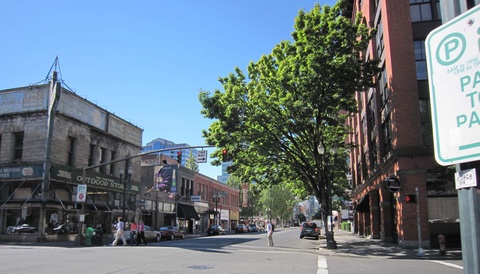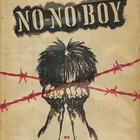Due to the circumstances of the war between Japan and the United States, Japanese Americans as a whole were persecuted in American society, but the underlying cause of this was racial prejudice, and throughout "No-No Boy" John Okada shows how to view this issue.
Most of the stories are about the reality of discrimination from white society and the frustration it causes. However, Okada also introduces a character who is free from discrimination and prejudice, something like the "conscience of America." That character appears in Chapter 7, a white man named Carrick who runs an engineering company.
To start the story from the beginning, Ichiro leaves prison and returns to Seattle to his family: his mother, who is fanatically patriotic to Japan with mixed feelings, his unreliable father, and his younger brother Taro, who refuses to be drafted and rebels against both Ichiro and his mother.
He then meets his friend Freddie, who is in the same situation, and then meets Kenji, who lost a leg while serving in the military.They travel together to neighboring Portland, Oregon, when Kenji is re-admitted to the hospital.
There are people who apologize on behalf of the country.
Chapter 7 begins with Ichiro, who has seen Kenji off at the hospital, going out to look for work in the city of Portland. In an attempt to make a new life and leave his past behind, Ichiro visits an engineering company he saw in a newspaper ad.
There was de facto discrimination against Japanese Americans when it came to choosing a career, and Ichiro was worried about being asked about his background, including his refusal to serve in the military. However, the president of the small company he met, Carrick, accepted Ichiro's identity as a Japanese American, and sympathized with the Japanese Americans who had been treated unfairly during the war, criticizing the government's response as an American and even apologizing to Ichiro.
"It was a huge mistake for our country to treat you so badly. There was no reason for it to happen. It's a huge stain on American history, I mean it. I've always been a loud, chatty, jolly American, but when it happened I was kind of devastated. I'm not as proud as I used to be. But if we made a mistake, maybe we learned something from it. You'd hope. We're still the greatest country in the world, after all. But I'm sorry it happened."
After saying this, he proposes to hire Ichiro under exceptionally favorable conditions. Ichiro is surprised and pleased. However, Ichiro hesitates to accept his kindness, as he is not a Japanese person like himself. Carrick is confused by Ichiro's reaction, so Ichiro honestly tells him about his background. Carrick shows understanding and advises Ichiro not to blame himself.
"I feel sorry for you and the circumstances behind why you had to do that. It's not your fault in any way. You know that, don't you?"
Although I am grateful, I chose a different path.
Ichiro then explains why he chose the path he did in the past. This is the important part.
"I had no choice. Sometimes I think it was my mother's fault, but maybe it's something bigger than my mother. It's bigger than my mother's refusal to understand that I'm not like her. It doesn't make sense, does it? Seriously. First the country took us away from the West Coast and put us in camps to make us realize that we weren't Americans worthy of trust. Then they tried to draft us into the military. It was frustrating. I was angry and hurt. But still, many people served in the military. But I didn't. So you understand. Thank you."
Still, Carrick tried to accept Ichiro. Ichiro was grateful for Carrick's consideration and generosity. But in the end, Ichiro decided to turn down Carrick's offer. Carrick's idea of starting over taught Ichiro that he needed to go back to the basics and start afresh.
Kenji talks about the ideal world
Ichiro spends the night in Portland and visits Kenji in the hospital the next morning. Kenji is completely weak and realizes that death is near. The words that Ichiro and Kenji exchange here suggest the issue of racial discrimination and the ideal of overcoming it.
Kenji begins by talking about the backlash from Japanese people who went to war against Ichiro and the other "No-No Boys."
"Those who are harsh on you probably have a twisted way of thinking, and they think it's great that they get killed or shot, but when it's actually nothing, they say it's your fault."
Kenji criticizes the closed nature of Japanese people and other people of the same race or ethnicity, and asks why Japanese people still want to hang out in groups even after the war.
"...the government said you guys were Japs so everyone screamed. Then when they finally came out, they couldn't wait any longer and they rushed together to prove they were Japs."
Kenji, who has come to terms with his own death, tells Ichiro about the ideal world he envisions. These poignant yet beautiful words make one wonder if they are the author's ideal.
"Think of me while you drink. Drink to my departure, wherever I may go. I hope there will be no distinction between Japs, Chinks, Dukes of Judas, Dukes of Poes, Niggers and Frenchies. I hope we are all just human beings."
Kenji served on the European front and shot and killed Germans on the battlefield, which led him to say, "I want to live in another world where only humans exist."
"Because if I'm still a Jap and he's still a German, I'll have to shoot him again. I don't want to have to do that."
Finally, Ichiro was asked by Kenji to deliver a message to his father and Emi, so he left the hospital and returned to Seattle.
(Translation by the author)
© 2016 Ryusuke Kawai







